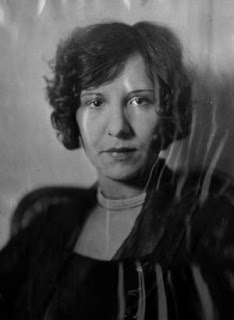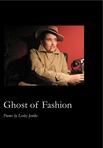The World's Greatest (Baddest?) Bootlegger
So last April-ish, I decided to start writing prose. I didn't really know if what I was doing could somehow be construed as fiction or non--or if it was probably some kind of hybrid, lyric essay thing destined to alienate readers and prove I'm terrible at lines that wrap around. But then I got caught up doing other things--namely trying to figure out what to do with a poetry manuscript and writing poems about Dorothy Wordsworth, and frittering away whole evenings watching HBO.
Anyway, I'm back at it. I don't really know where it's going or how it'll end up, or if it's even a useful way to spend my time. All I know is it has something to do with art theft, something to do with George Remus, something to do with Cincinnati, and something to do with Boston. To motivate myself, I'm going to post a segment here every week (imagining someone besides me may actually read it). Let's say Sunday or Monday. I'm probably running some kind of risk here, but if I'm anything, I'm an idiot. So here's my first installment:
 George Remus stole liquor or—not so much stole as illegally imported. Whether Cincinnati knew it or not, it had become a frontier town for the third time in its history; for the second time its borders and liminal spaces were secret; for the first time they were virtual. The Ohio River, as an actual demarcation between the North and South, now became just another byway to be bridged on whisky’s path from Kentucky to Ohio, distillation to consumption. While older, deeper divisions still existed in some nostalgic haze folks reckoned was like the variable morning fog over Lunken Airport (man wasn’t meant to fly), in reality these divisions were moot. It was all one big country again, but a country divided over the philosophical conjecture that men (and women) could live without booze. The lines lawmakers and dutiful citizens had drawn in theory between sin and decency were fuzzy at best, and Remus meant to cross them, and double-cross them. He had the distinct feeling men (and women) couldn’t live without booze. It was more than a philosophy—it was a business model. And he made Cincinnati his base of operations because it was a crossroads, a doorway, a verge. To the goddess of liminal spaces he pledged his allegiance and made his sacrifices. Her name was Imogene and she was his wife. Remus and his wife drove in separate cars to sign their divorce papers, making of themselves a two-person funeral procession. Their route took them from Quebec Road in Price Hill to Westwood Avenue to Vine Street to East Liberty Street to Gilbert Avenue, up into Eden Park where, in October, the oak groves had begun to blush to a deep red, their dropped leaves like the blood orange rinds Imogene had sucked and thrown down laughing onto their Parisian breakfast table years ago. Her appetite had always been happy and loud. The cars never once lost sight of each other, despite merging traffic, and it was only when Imogene’s driver slowed to yield that George happened to glance up and see her stumbling out of her Rolls’ opened door, breaking into a run—gawky because of her black hobble skirt—toward the park’s Gazebo at Mirror Lake. The next thing George knew he was chasing her, a pistol in his hand.
George Remus stole liquor or—not so much stole as illegally imported. Whether Cincinnati knew it or not, it had become a frontier town for the third time in its history; for the second time its borders and liminal spaces were secret; for the first time they were virtual. The Ohio River, as an actual demarcation between the North and South, now became just another byway to be bridged on whisky’s path from Kentucky to Ohio, distillation to consumption. While older, deeper divisions still existed in some nostalgic haze folks reckoned was like the variable morning fog over Lunken Airport (man wasn’t meant to fly), in reality these divisions were moot. It was all one big country again, but a country divided over the philosophical conjecture that men (and women) could live without booze. The lines lawmakers and dutiful citizens had drawn in theory between sin and decency were fuzzy at best, and Remus meant to cross them, and double-cross them. He had the distinct feeling men (and women) couldn’t live without booze. It was more than a philosophy—it was a business model. And he made Cincinnati his base of operations because it was a crossroads, a doorway, a verge. To the goddess of liminal spaces he pledged his allegiance and made his sacrifices. Her name was Imogene and she was his wife. Remus and his wife drove in separate cars to sign their divorce papers, making of themselves a two-person funeral procession. Their route took them from Quebec Road in Price Hill to Westwood Avenue to Vine Street to East Liberty Street to Gilbert Avenue, up into Eden Park where, in October, the oak groves had begun to blush to a deep red, their dropped leaves like the blood orange rinds Imogene had sucked and thrown down laughing onto their Parisian breakfast table years ago. Her appetite had always been happy and loud. The cars never once lost sight of each other, despite merging traffic, and it was only when Imogene’s driver slowed to yield that George happened to glance up and see her stumbling out of her Rolls’ opened door, breaking into a run—gawky because of her black hobble skirt—toward the park’s Gazebo at Mirror Lake. The next thing George knew he was chasing her, a pistol in his hand.
Anyway, I'm back at it. I don't really know where it's going or how it'll end up, or if it's even a useful way to spend my time. All I know is it has something to do with art theft, something to do with George Remus, something to do with Cincinnati, and something to do with Boston. To motivate myself, I'm going to post a segment here every week (imagining someone besides me may actually read it). Let's say Sunday or Monday. I'm probably running some kind of risk here, but if I'm anything, I'm an idiot. So here's my first installment:
 George Remus stole liquor or—not so much stole as illegally imported. Whether Cincinnati knew it or not, it had become a frontier town for the third time in its history; for the second time its borders and liminal spaces were secret; for the first time they were virtual. The Ohio River, as an actual demarcation between the North and South, now became just another byway to be bridged on whisky’s path from Kentucky to Ohio, distillation to consumption. While older, deeper divisions still existed in some nostalgic haze folks reckoned was like the variable morning fog over Lunken Airport (man wasn’t meant to fly), in reality these divisions were moot. It was all one big country again, but a country divided over the philosophical conjecture that men (and women) could live without booze. The lines lawmakers and dutiful citizens had drawn in theory between sin and decency were fuzzy at best, and Remus meant to cross them, and double-cross them. He had the distinct feeling men (and women) couldn’t live without booze. It was more than a philosophy—it was a business model. And he made Cincinnati his base of operations because it was a crossroads, a doorway, a verge. To the goddess of liminal spaces he pledged his allegiance and made his sacrifices. Her name was Imogene and she was his wife. Remus and his wife drove in separate cars to sign their divorce papers, making of themselves a two-person funeral procession. Their route took them from Quebec Road in Price Hill to Westwood Avenue to Vine Street to East Liberty Street to Gilbert Avenue, up into Eden Park where, in October, the oak groves had begun to blush to a deep red, their dropped leaves like the blood orange rinds Imogene had sucked and thrown down laughing onto their Parisian breakfast table years ago. Her appetite had always been happy and loud. The cars never once lost sight of each other, despite merging traffic, and it was only when Imogene’s driver slowed to yield that George happened to glance up and see her stumbling out of her Rolls’ opened door, breaking into a run—gawky because of her black hobble skirt—toward the park’s Gazebo at Mirror Lake. The next thing George knew he was chasing her, a pistol in his hand.
George Remus stole liquor or—not so much stole as illegally imported. Whether Cincinnati knew it or not, it had become a frontier town for the third time in its history; for the second time its borders and liminal spaces were secret; for the first time they were virtual. The Ohio River, as an actual demarcation between the North and South, now became just another byway to be bridged on whisky’s path from Kentucky to Ohio, distillation to consumption. While older, deeper divisions still existed in some nostalgic haze folks reckoned was like the variable morning fog over Lunken Airport (man wasn’t meant to fly), in reality these divisions were moot. It was all one big country again, but a country divided over the philosophical conjecture that men (and women) could live without booze. The lines lawmakers and dutiful citizens had drawn in theory between sin and decency were fuzzy at best, and Remus meant to cross them, and double-cross them. He had the distinct feeling men (and women) couldn’t live without booze. It was more than a philosophy—it was a business model. And he made Cincinnati his base of operations because it was a crossroads, a doorway, a verge. To the goddess of liminal spaces he pledged his allegiance and made his sacrifices. Her name was Imogene and she was his wife. Remus and his wife drove in separate cars to sign their divorce papers, making of themselves a two-person funeral procession. Their route took them from Quebec Road in Price Hill to Westwood Avenue to Vine Street to East Liberty Street to Gilbert Avenue, up into Eden Park where, in October, the oak groves had begun to blush to a deep red, their dropped leaves like the blood orange rinds Imogene had sucked and thrown down laughing onto their Parisian breakfast table years ago. Her appetite had always been happy and loud. The cars never once lost sight of each other, despite merging traffic, and it was only when Imogene’s driver slowed to yield that George happened to glance up and see her stumbling out of her Rolls’ opened door, breaking into a run—gawky because of her black hobble skirt—toward the park’s Gazebo at Mirror Lake. The next thing George knew he was chasing her, a pistol in his hand.
Published on September 16, 2012 11:59
No comments have been added yet.



